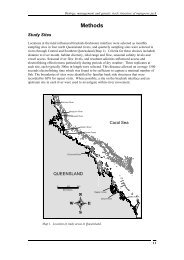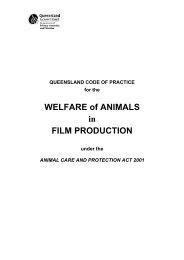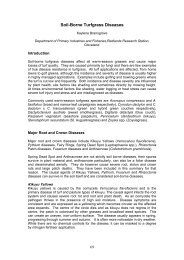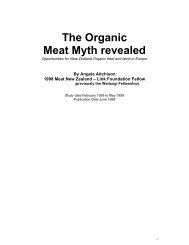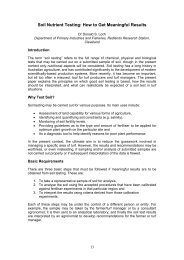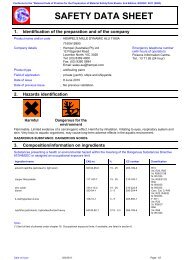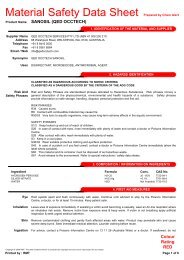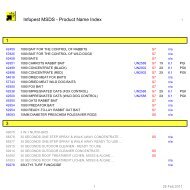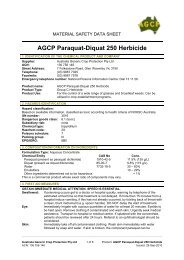Guidelines For Rural Beekeeping In Queensland
Guidelines For Rural Beekeeping In Queensland
Guidelines For Rural Beekeeping In Queensland
Create successful ePaper yourself
Turn your PDF publications into a flip-book with our unique Google optimized e-Paper software.
Department of Natural Resources and Mines requirements<br />
Department of Natural Resources and Mines (NR&M) administers the majority of State-owned land<br />
on which it may be desirable to locate apiary sites.<br />
The areas under their jurisdiction include:<br />
• Reserves (excluding State <strong>For</strong>est Reserves and Protected Areas)<br />
• Roads (Local/State Government Roads and Stock Routes)<br />
• Unallocated State Land.<br />
NOTE: <strong>For</strong> areas leased from the State, private negotiations and arrangements with the lessee may<br />
be made at the lessee’s discretion, as long as the proposed use will not be inconsistent with the<br />
purpose and conditions of the head lease. The arrangement can be as formal as a written sublease,<br />
and requires the consent of the Minister for Natural Resources and Mines. The lease must be<br />
registered in the Land Registry. The lessee is also entitled to charge rent for the area identified under<br />
the sublease. The term of any agreement or sublease must not extend past the expiry date of the<br />
head lease.<br />
Authorised access to the above-mentioned State-owned land can be obtained by submitting an<br />
application (Land Act Application <strong>For</strong>m 104) to the NR&M district office in the locality of the<br />
desired site. The application also needs to be accompanied by a sketch or map depicting the land<br />
area to be affected by the application.<br />
Important Note: Siting an apiary on any of the above-mentioned State-owned land without<br />
authorisation may be dealt with as a trespass related act and be subject to payment of a penalty.<br />
NR&M application requirements<br />
When making an application to NR&M for access to the above-mentioned State-owned land,<br />
beekeepers may apply for either a Short Term Permit or a Permit to Occupy.<br />
Short Term Permit<br />
An application fee of $87.80 applies — a Short Term Permit may be issued to a person or organisation<br />
wishing to use an area of Unallocated State land, reserve (that is not already subject to an existing<br />
lease) or road (including Stock Routes) for a short period of time only (up to a maximum of three<br />
months). The occupation of the authorised land does not give the holder exclusive possession of the<br />
land, i.e. the use of the land must co-exist with the purpose for which the land has been set aside.<br />
Therefore, the Short Term Permit may not be sold, subleased or mortgaged.<br />
Permit to occupy<br />
An application fee of $87.80 applies plus other fees as mentioned below — Permits to Occupy are<br />
issued by the State to a permittee on a continuing basis, for a right to occupy or use State-controlled<br />
land, including unallocated State land, roads (including Stock Routes) or reserves, so long as the<br />
annual rent is paid. However, the permit may be cancelled at any time by the Director-General,<br />
NR&M upon giving reasonable notice to the permittee (at least 28 days). This would normally only<br />
occur if the land is required for some changed purpose. As with a Short Term Permit, a Permit to<br />
Occupy does not give the holder exclusive possession of the land, i.e. must be able to co-exist with<br />
the purpose for which the land has been set aside. Therefore, a Permit to Occupy may not be sold,<br />
subleased or mortgaged. If an application for a Permit to Occupy is approved, payment of a $44.25<br />
19




